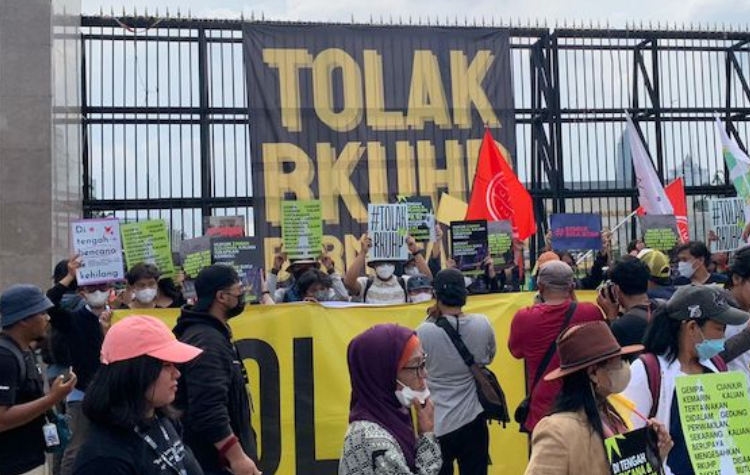(Jakarta, 7 December 2022) – The Asian Forum for Human Rights and Development (FORUM-ASIA) and its members in Indonesia condemn the inclusion of problematic provisions to the new Indonesian Criminal Code enacted yesterday. The Code was passed despite the massive and widespread public protest and criticism over the articles that could disregard gross human rights violations, and limits civil liberties and fundamental freedoms, including freedoms of expression, association, and peaceful assembly.
Under Article 136 of the new Criminal Code, courts cannot prosecute gross human rights violations exceeding the time period of twenty (20) years for a crime that is punishable by imprisonment, life imprisonment, or the death penalty. Given Indonesia’s turbulent history of historical injustices, victims of gross human rights violations and their relatives face additional barriers in seeking adequate reparations and accessing justice for their prolonged suffering.
“These questionable articles endanger human rights defenders, journalists, vulnerable and marginalised groups, as well as the public who have been and will be very active in criticising human rights violations. The new Criminal Code only legitimises the colonialism values that are contradictory is contradictory with the initial claim of the revision intention, that is to be free from the colonialism legacy in the existing Criminal Code”,” said the rights groups.
In relation to freedom of expression, Article 188 and 189 sanctions forms of speech and expression contradicting the Pancasila (state ideology) and also raises the sentence for those found guilty of “insulting” public officials, such as the President and Vice President, as well as insubordination during peaceful protests under Article 218. These provisions could be used to criminalise voices of dissent, including human rights defenders
The above vague provision supplements Article 256, which outlaws peaceful demonstrations without the prior permission from authorities with a maximum imprisonment of six (6) months and thus, further stifles people’s freedom of expression,peaceful assembly and association. Another provision, Article 280, prohibits the publishing of trial processes without the court’s permission—a huge blow to the country’s deteriorating press freedom and heightening censorship on press freedom and right to information.
Through Article 415, the new Criminal Code sanctions premarital sex and cohabitation, which can be reported by parents and children, to up to one year in prison. Consensual sex is not a criminal offense, and this provision is a violation to the rights to privacy, could be misused to criminalise sexual assault victims, and would further restrain the rights of the LGBTIQ community and Indonesia’s religious minorities.
Since 2019, civil society has raised concerns about the lack of transparency in accessing draft amendments and called on the Indonesian government to ensure the meaningful participation of stakeholders in deliberating on the Criminal Code. Pleas were left unheeded when in July, the Ministry of Law and Human Rights handed over the finalised draft of the amendment of the Criminal Code to the parliament for further discussions.
“The Criminal Code should not have been passed in the first place, and it is a massive setback to democracy and human rights in the country. We call on President Joko Widodo and the house of representatives to amend or repeal these egregious provisions in the new Criminal Code, which gravely impact Indonesia’s compliance with international human rights standards, especially in light of its recent Universal Periodic Review (UPR). Instead of protecting fundamental freedoms, the new Criminal Code compliments the enforcement of vague and repressive laws previously passed by the Indonesian government, such as the Information and Electronic Transactions Law,” the concerned groups said.
Signatories:
- Asian Forum for Human Rights and Development (FORUM-ASIA)
- Commission for the Disappeared and Victims of Violence – Komisi untuk Orang Hilang dan Korban Tindak Kekerasan (KontraS)
- Institute for Policy Research and Advocacy (ELSAM)
- Indonesia Legal Aid Foundation – Yayasan Lembaga Bantuan Hukum Indonesia (YLBHI)
- Yayasan Sekretariat Anak Merdeka Indonesia (SAMIN)
- Indonesian Legal Aid and Human Rights Association (PBHI)
- The Indonesian Human Rights Monitor – Inisiatif Masyarakat Partisipatif untuk Transisi Berkeadilan (Imparsial)
- Human Rights Working Group (HRWG) – Indonesia’s NGO Coalition for International Human Rights Advocacy
- The Alliance of Independent Journalists Indonesia (AJI)
For further information, please contact:
- East Asia-ASEAN Programme, FORUM-ASIA, [email protected]
For media inquiries, please contact:
- Communication and Media Programme, FORUM-ASIA, [email protected]
**
For PDF version of this statement, click here



